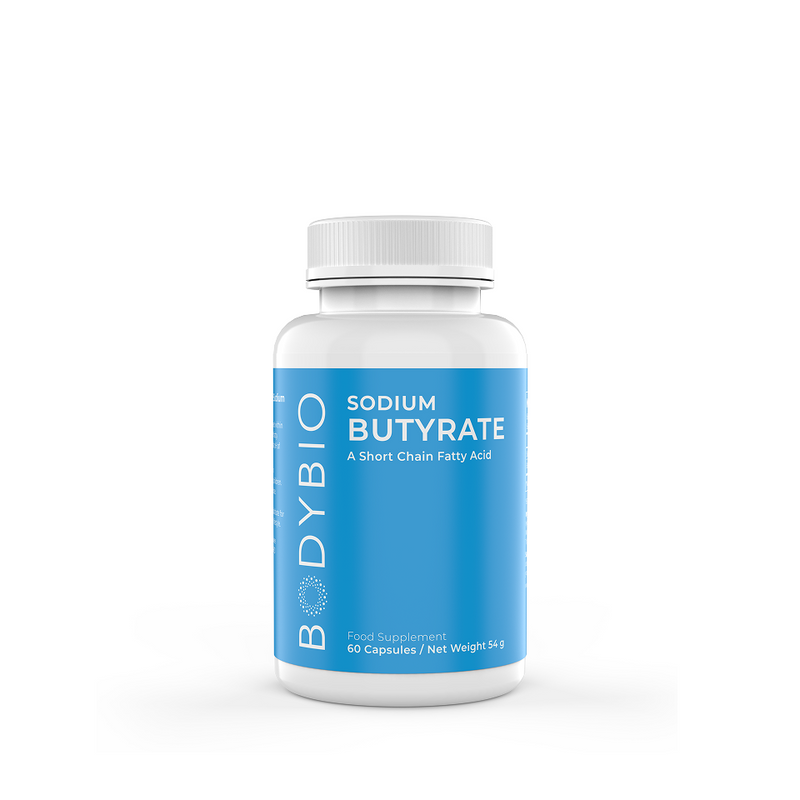What’s the Deal With Ozempic? Exploring Alternatives Like Berberine & Butyrate for Weight Loss
Key Takeaways:
Key Points:
- If you’ve ever felt helpless against food cravings or find it impossible to shed those five or ten extra pounds, the problem might not be you. It might be insulin resistance. Balancing your blood sugar levels (and specifically, keeping excess sugar out of your liver and adipose tissue) used to be overlooked when it comes to weight management. Now, doctors and scientists are considering it the next frontier.
- Ozempic is making waves in the celebrity world as a “quick fix” to weight loss. This pharmaceutical drug is pretty effective and works by targeting insulin resistance and promoting blood sugar balance. But it doesn’t come without significant risks. Natural supplements like butyrate and berberine for weight loss (alongside a healthy diet) may provide better long-term results.
- Supplements aren’t the only way to target insulin-induced weight gain. There are simple lifestyle changes you can make, too. Try eating your foods in the right order (veggies, protein, fats, and then carbs) and walking after meals to improve carbohydrate metabolism.
It’s like finding the holy grail — the illusive “quick fix” for weight loss. Maybe it’s intermittent fasting, a game-changing supplement, or the recently popular pharmaceutical Ozempic.
When your goal is to lose weight, everyone is cheering for you on your journey to find the healthiest version of yourself. But it feels like your own body isn’t on board. In fact, it’s working against you.
You’ve tried every weight loss trick in the book (counting calories, cutting carbs, and Whole 30) — but the numbers on the scale just won’t budge. The “stubborn body fat” remains, well, stubborn.
Have you ever considered that the problem might not be your willpower?
Your body is brilliant. It may have its own reasons for holding onto those extra ten pounds. Insulin resistance, for example.
Recent studies are connecting the relationship between insulin resistance (aka, blood sugar imbalance) and weight gain. This is why drugs like Ozempic seem to work so well — they target blood sugar imbalance.
In this blog, we’re taking a deep dive into the popular pharmaceutical, Ozempic (or semaglutide) and offering some natural alternatives. Butyrate, berberine, and natural blood sugar balancing can all play a vital role in your weight loss journey — and finally get you off that plateau.
Table of Contents:
- 5 Questions to Ask Before Considering Weight Loss Solutions
- The Next Frontier of Weight Loss: Blood Sugar Balance
- Should You Use Semaglutide for Weight Loss?
- Berberine for Weight Loss
- Butyrate for Weight Loss
- Other Lifestyle Tips to Help You Balance Blood Sugar
- Blood Sugar Balance is a Life Long Journey — Find Natural Solutions that Work for Your Body
5 Questions to Ask Before Considering Weight Loss Solutions
With all the celebrity buzz around weight loss solutions like semaglutide (aka Ozempic), it’s important to evaluate whether or not weight loss prescriptions or supplements are right for you. It’s easy to jump on the bandwagon, but it’s important to remember that the easy solution is not always the best solution.
There’s a lot more that goes into weight loss than we think. And the root cause behind the extra pounds might not just be your eating habits. Here are some questions to ask yourself before exploring a weight loss solution, pharmaceutical, or otherwise:
- Do I already target weight management with a balanced diet, exercise routine, and a good sleep schedule? Getting rid of the extra pounds via “quick fix” might sound great. But a healthy lifestyle is the backbone of your weight loss journey — and these lifestyle habits will keep you looking and feeling well, long-term.
- Have I been exposed to mycotoxins (mold), heavy metals, or other environmental toxins? Instead of allowing these toxins to constantly circulate through your bloodstream, your body can actually store them in adipose tissue (yep, fat), causing your body to hold onto more of it. Usually, detox is the best way to target weight loss after toxin exposure.
- Am I dealing with trauma? A recent study shows that traumatic life events can increase obesity risk by up to 36%. This may be partly due to widespread inflammation. Make sure you’re making space for emotional healing alongside weight loss strategies.
- Is my blood sugar out of whack? Insulin resistance is a huge factor in the weight loss conversation — and the semaglutide alternatives we recommend here are designed to target it. Still, it’s important to evaluate your own symptoms. Do you regularly feel hungry just a few hours after a meal? Does sugar (or refined carbs) give you an energy high followed by nervous jitters?
- Am I deficient in any vitamins, minerals, or other nutrients? Tread carefully into weight loss solutions if you know you have a deficiency. Not only can healthy stores of vitamins and minerals help with weight loss (chromium is known for its weight loss benefits), but it can also be dangerous to take something that curbs your appetite when you’re deficient in nutrients.
The Next Frontier of Weight Loss: Blood Sugar Balance
Calorie counting, fad diets, and long hours at the gym. Sound familiar? For decades, these have been the primary recommendations for weight loss. They are supposed to be “tried and true” methods to tip the scale and help you feel better from the inside out.
But what if these weren’t the only factors to consider when it comes to your weight?
Maybe you’ve tried all the diets, maintain an active lifestyle, and eat salad for lunch every day. Yet your progress is virtually non-existent, not to mention you feel tired and irritable half the time. Don’t beat yourself up yet. The problem might not be you. It could be your blood sugar.
Recent studies show that weight gain and insulin resistance are extremely connected. How?
Here’s a behind-the-scenes look at insulin resistance and what could be happening in your body:
- Your cells become desensitized to insulin, the hormone that helps escort glucose, the body’s preferred fuel source, into your cells.
- As a natural response, your pancreas makes even more insulin to help glucose enter your cells. When the cells still can’t respond to insulin, blood sugar levels begin to increase.
- Excess blood sugar needs a place to go. In a healthy person, excess sugar is stored in the liver for future use. However, if your liver is overloaded, the sugar may be stored in adipose tissue (aka, fat) instead.
- Weight gain becomes a natural side-effect of insulin resistance — and it’s difficult to reverse with diet alone, especially if you don’t understand the root cause.
So what’s the solution? Supplements like berberine and butyrate for weight loss can help your cells become more sensitive to insulin. As your pancreas begins to produce less insulin, excess sugar should be released from the adipose tissue.
Weight Loss Solutions that Consider Blood Sugar
Fallen down the rabbit hole of blood sugar balance? We did, too. Although Ozempic is marketed as a “quick fix” to blood sugar balancing, there are a number of other ways to conquer insulin resistance without the pharmaceutical side effects.
Should You Use Semaglutide for Weight Loss?
Semaglutide (or Ozempic) is a synthetically created peptide (a string of amino acids). It belongs to a class of medications called GLP-1 agonists, which work by mimicking a compound called GLP-1 (glucagon-like peptide 1), a hormone that is released by the body during a meal. You might also now be hearing about tirzepatide (Mounjaro), which is similar to semaglutide and prescribed for type 2 diabetes.
Semaglutide and tirzepatide are meant to stimulate insulin and lower blood glucose levels at the same time. It slow down the digestive process, further delaying glucose absorption and helping you feel fuller for longer. But are there side effects? Absolutely.
Ozempic belongs to a class of medications called GLP-1 agonists. GLP-1 agonists work by mimicking a gut hormone called GLP-1 to lower blood glucose levels after you’ve eaten a meal. They also block your liver from making glucose and help you feel full for a longer period of time.
Ozempic is prescribed in cases of type 2 diabetes, high blood pressure, and occasionally high cholesterol. But despite its current popularity, it shouldn’t be used by just anyone. Reported side effects include things like malnutrition, nausea, constipation, and even stomach paralysis. We can’t imagine having food hang out in your GI tract for longer than usual is good for your microbiome, either.
The good news is, that it’s entirely possible to use natural supplements to balance blood sugar — and achieve similar effects to Ozempic.
Berberine for Weight Loss
Recently dubbed “nature’s Ozempic”, berberine is found in plants like goldenseal, goldthread, and tree turmeric. In studies, it’s shown to effectively address type 2 diabetes. Berberine was originally used in Chinese medicine and Ayurveda as a blood sugar-balancing herb.
Essentially, berberine works to lower blood sugar spikes, which can stabilize weight and support the liver — allowing your body to effectively utilize blood sugar, instead of storing it in fat tissue. Over time, berberine has also been shown to increase the cell’s sensitivity to insulin, so your body can produce less of it while still transporting glucose out of the bloodstream and into the cells.
Berberine has other added benefits, too. It has anti-inflammatory properties (which may help to reduce overall puffiness) and may protect against heart disease.
Butyrate for Weight Loss
Butyrate is a short-chain fatty acid and postbiotic. It naturally occurs in the body as a result of a healthy microbiome — and it’s used as a fuel source by colonocyte cells (cells lining and protecting the colon). In studies, butyrate is connected to a myriad of health benefits, including gut lining support, lowered inflammation, improved sleep, and better cognitive function.
Remember Glucagon-like peptide 1 — the hormone stimulated by semaglutide injections? Butyrate also stimulates this hormone but without the use of injections or synthetically created peptides. Butyrate can help you stay fuller longer, curbing carb cravings and lowering the risk of blood sugar spikes.
The gut may play a significant role in blood sugar balance and weight loss, too. Butyrate is a safe supplement that targets both the gut microbiome and the cell’s sensitivity to insulin. So it can help you manage insulin resistance while improving metabolism and digestion. In one study, butyrate helped to reduce body fat content by 10%. In the same study, butyrate supplements improved fasting glucose and curbed high-fat diet weight gain.
Another study recently showed that butyrate is an effective supplement for pediatric obesity alongside standard care. Children who supplemented with butyrate (vs. placebo) over six months showed greater improvements in BMI, fasting glucose, insulin, cholesterol levels, inflammatory markers, and more.
Other Lifestyle Tips to Help You Balance Blood Sugar
Weight loss doesn’t have to require extremely low-calorie diets or pharmaceutical injections. For most people, just a few lifestyle changes and targeted supplements can really make a difference in their weight — and in how they feel.
The thing about blood sugar imbalance is that it doesn’t just promote weight gain, it also makes you feel hungry all the time, drives sugar cravings, and exacerbates symptoms like inflammation and brain fog. Balancing your blood sugar isn’t just about weight — it’s about quality of life.
Here are some tools to help balance blood sugar and conquer insulin resistance naturally:
- Balance your plate. We recommend filling half of your plate with non-starchy veggies followed by protein (25% of your plate) and whole grains (another 25%). Around 2-3 tablespoons of healthy fats should be included, too.
- Try chromium for weight loss. As a trace mineral, we don’t need a lot of chromium to survive. But we’re also not getting a lot of chromium in our fruits and veggies (thanks to modern farming). A chromium supplement may help to increase insulin sensitivity in the cells.
- Try low-intensity exercise after you eat. A brisk walk after a heavy-carb meal can help you metabolize sugar and curb blood sugar spikes.
- Use psyllium husk. An effective fiber supplement, psyllium husk has shown promising effects on insulin resistance and high blood sugar. It’s known to improve digestion and help you stay fuller for longer. Bonus: if your weight gain has something to do with toxin exposure, psyllium husk acts as a natural binder.
Blood Sugar Balance Is a Life-Long Journey — Find Natural Solutions that Work for Your Body
Did you know? The fruit you’re eating today isn’t the same fruit our ancestors ate. It’s actually bred and genetically modified to have a higher sugar content.
Sugar and sugar substitutes act like a drug. Even simple foods like peanut butter and yogurt are packed full of sugar — and this isn’t going to change anytime soon.
No wonder our cells can’t keep up.
While it’s important to be intentional with your diet (eat a healthy balance of protein, fats, and whole grains) and lifestyle (manage stress, exercise, and so on), it’s useful to have other solutions to help maintain weight and wellness, too.
We believe butyrate is the best option for supporting healthy weight loss alongside a healthy diet and lifestyle. Targeting the microbiome, cells, and blood sugar, butyrate is all-natural and is already familiar to the body. It eases digestive discomfort and targets insulin resistance — while feeding your cells, instead of stripping them of nutrients.
Rustenbeck I. (2002). Desensitization of insulin secretion. Biochemical pharmacology, 63(11), 1921–1935. https://doi.org/10.1016/s0006-2952(02)00996-6
Mendes de Oliveira, E., Silva, J. C., Ascar, T. P., Sandri, S., Marchi, A. F., Migliorini, S., Nakaya, H. T. I., Fock, R. A., & Campa, A. (2022). Acute Inflammation Is a Predisposing Factor for Weight Gain and Insulin Resistance. Pharmaceutics, 14(3), 623. https://doi.org/10.3390/pharmaceutics14030623
Yin, J., Xing, H., & Ye, J. (2008). Efficacy of berberine in patients with type 2 diabetes mellitus. Metabolism: clinical and experimental, 57(5), 712–717. https://doi.org/10.1016/j.metabol.2008.01.013
van Deuren, T., Blaak, E. E., & Canfora, E. E. (2022). Butyrate to combat obesity and obesity-associated metabolic disorders: Current status and future implications for therapeutic use. Obesity reviews : an official journal of the International Association for the Study of Obesity, 23(10), e13498. https://doi.org/10.1111/obr.13498
Kant, R., Chandra, L., Verma, V., Nain, P., Bello, D., Patel, S., Ala, S., Chandra, R., & Antony, M. A. (2022). Gut microbiota interactions with anti-diabetic medications and pathogenesis of type 2 diabetes mellitus. World journal of methodology, 12(4), 246–257. https://doi.org/10.5662/wjm.v12.i4.246







